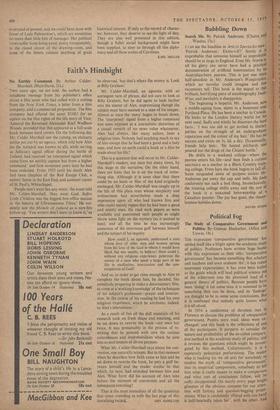Faith's Hindsight
No Earthly Command. By Arthur Calder- Marshall. (Hart-Davis, 21s.) Two years ago, we are told, the author had a telephone message from his publisher's office about a film scout who had called with a cutting from the New York Times, a letter from a film company, and a commercial proposition. The film company had offered the scout $5,003 for an option on the film rights of the life story of Vice- Admiral the Reverend Alexander Riall Wadham Woods, provided that this appeared as a full-scale book between hard covers. On the following day Mr. Calder-Marshall saw the cutting, an obituary notice put out by an agency, which told how Alex (as the Admiral was known to all), while serving as • Jellicoe's signal officer during the battle of Jutland, had received 'an interposed signal which came from no earthly captain but from a higher command,' and how seventeen years later he had been ordained. From 1933 until his death Alex had been chaplain of the Red Ensign Club, a sailors' home in the East End, and assistant curate of St. Paul's, Whitechapel.
'People don't want Sex any more,' the scout told Mr. Calder-Marshall, 'they want God. Suffer Little Children was the biggest box-office success in the history of Ultramontane Films.' He evi- dently saw the Miracle of Jutland as a sure-fire follow-up. 'You writers don't seem to know it,' as
he observed, 'but that's where the money is. Look at Billy Graham.'
Mr. Calder-Marshall, an agnostic with an astringent turn of phrase, did not care to look at Billy Graham, but he did agree to look farther into the matter of Alex, unpromising though the subject must have seemed to a man of his temper. Almost at once the 'story' began to break down. The 'interposed' signal from a higher command was soon exposed as a journalistic distortion of a casual remark of no news value whatsoever. Alex had always, like many sailors, been a religious man. Nobody had anything much to say of him except that he had been a good and a holy man, and how on earth could a book or a film be made about his life? '
This is a question that will occur to Mr. Calder- Marshall's readers, not once but many times, by this stage in the narrative. On the other hand, there are hints that he is on the track of some- thing else. Although it is soon clear that there could be no book or film of the kind originally envisaged, Mr. Calder-Marshall was caught up in the life of this plain man whose simplicity and ordinariness had nevertheless made a deep impression upon all who had known him and who could merely repeat that he had been a good and saintly man. He read such papers as were available and questioned such people as might throw some light on the mystery (as it seemed to him), and all the time he was increasingly conscious of the enormous gulf between himself and the subject of his inquiry.
How could 1, an agnostic, understand a man whose love of other men and women sprang from his love of the God in whom I would have liked, but was unable, to believe? How could I, without any religious experience, penetrate the secrets of a man who spent a large part of his life in meditation, intercession and the con- templation of God?
And so, in order to get close enough to Alex to complete the book about him, he decided, like somebody preparing to make a documentary film, to come at a 'working knowledge' of the techniques of his subject's profession—prayer and interces- sion. In the course of his reading he had his own religious experience, which he attributes, indeed, to Alex's intercession.
As a result of this all the dull materials of his research took on fresh shape and meaning, and he sat down to rewrite the book—not once but twice. It was presumably in the process of re- writing that he pointed with care the various coincidences and improbabilities which he now sees as instruments of divine purpose.
What Mr. Calder-Marshall says about his con- version, one naturally accepts. But in that moment when he describes how faith came to him and he sat down to rewrite the book, he puts a gulf be- tween himself and the reader similar to that which, he says, had stretched between him and Alex. What form did his account of Alex take before the moment of conversion and all the subsequent rewriting?
That is the most immediate of all the questions that come crowding in with the last page of this


































 Previous page
Previous page